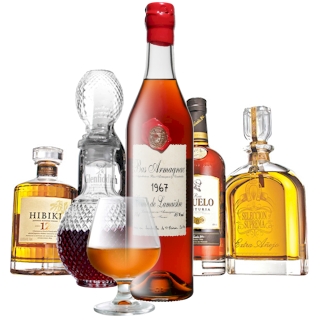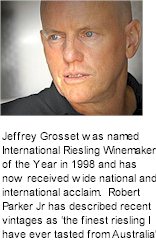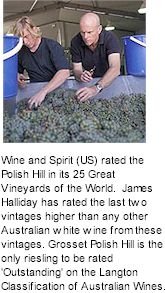


Established in 1981 by Jeffrey Grosset in the historic township of Auburn in the southern tip of the Clare Valley 100 kilometres north of Adelaide, the winery is stylish but functional and reflects the attention to detail that extends to the Grosset estate-owned Clare Valley vineyards and to the winemaking.

The Grosset Polish Hill vineyard is situated in a U-shaped ridge formation running north from Mount Horrocks. The soil is shaley, not especially fertile, and slightly acid, and the topsoil crust is of clay and shale. The Polish Hill vineyard does not have Watervale's air of abundance. On the contrary, the vines are smaller, working harder to draw sustenance from the less generous soil, and berries are smaller and more concentrated than those of Watervale.
In comparison to Watervale Riesling, Polish Hill is more austere, leaner, reflecting the nature of the terrain that Jeffrey Grosset, with his usual attention to geological constraints and possibilities, chose as his spot in the Polish Hill River area. Conscious of the historical as well as the geological significance of the district, Jeffrey Grosset often refers to his Polish Hill vineyard as Pawelski, to recognise a former land owner and one of the area's pioneers.
The Grosset Polish Hill – from a lean, spare even unlikely-looking terrain – has the purity, restraint, and austerity of art, but also its beauty, its resonance, its hidden surprises. As Langton's Australian Wine Guide puts it, ‘This is the most successful Australian riesling. Grosset is a perfectionist and the wines have incredible perfume and purity, lime/floral fruit profile balanced by an indelible acidity that cuts across the palate. This wine does much to define the distinctive character of Clare Valley riesling.'

Located in the north-eastern corner of the Clare Valley 's Watervale subregion and at its highest point, the Grosset Springvale vineyard has a thin crust of topsoil over a soft limestone base. Dark grey slate and slaty siltstone of the Mintaro Shale – about 750-800 million years old – underlie the area. The Springvale vineyard is a place of abundance and flavour. This should come as no surprise since Grosset's exhaustive research of viticultural potential and his meticulous care with the choice of the very earth itself was as geologically sophisticated and acute twenty-five years ago as it is now.
At the Grosset Springvale vineyard, rich red soil over limestone produces sturdy vines, big berries, chunky bunches and a lime green fruit. One hundred per cent hand-picked, the grapes are bigger than those on the Polish Hill vines and offer a generous, fruity bursting taste. In its full ripeness on the eve of picking, the vineyard presents a thick, undulating prospect of green – grapes and vines giving a sense of plenty and of flavours ready to burgeon.
In some ways, these characteristics of soil and vines preview the nature of the wine that comes from this vineyard, dry with a mineral edge, savoury, yet with a noticeable fullness and richness and pronounced riesling fruit flavour. The first taste is like biting into a grape.
Grosset's Gaia is one of the most astonishing vineyards you'll see. Planted at 570 metres, at the highest point of the Clare Valley , the vineyard is an elongated triangular wedge of emerald green that sits above the rolling golden cornfields of the Clare Valley.
